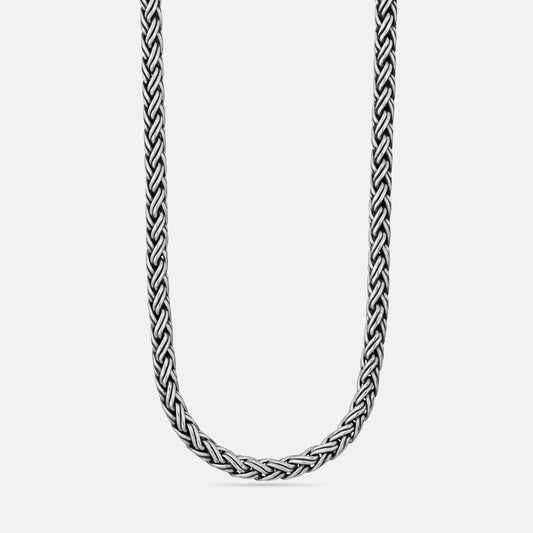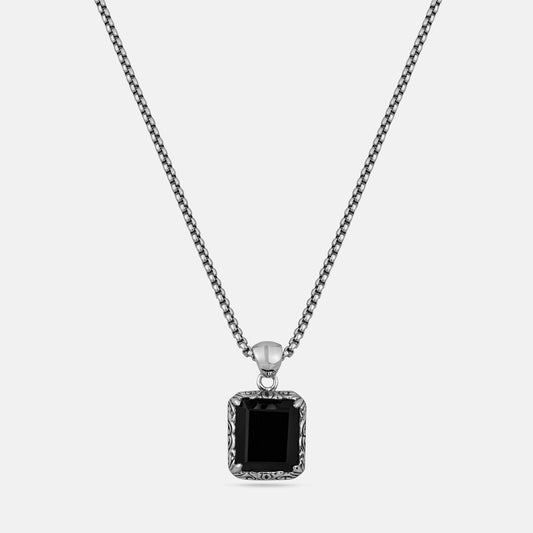Some discoveries captivate us from the start, and their allure never fades. Trends may change and time moves on, but their charm remains timeless and unshaken.
Sterling silver is one such discovery.
For centuries, we’ve been held spellbound by its ability to take any shape, endure harsh conditions, and add an alluring luster to its surroundings.
If you’ve adopted sterling silver finery—like the Clocks and Colours collection—into your jewelry box, you’re not just collecting adornments—you’re embracing a legacy of elegance and enduring beauty that stands the test of time. You might be wondering, does sterling silver tarnish easily? Even this magnificent metal, when exposed to oxygen and sulfur particles in the air, can start to develop a yellow or green discoloration called tarnish.1
This doesn’t mean your men’s or women’s sterling silver jewelry has permanently lost its gleam; regular cleaning can preserve its captivating sheen.
Essential Tools and Supplies for Cleaning Silver Jewelry
Perhaps you’ve noticed that your sterling silver looks splotchy and discolored or that its glimmer has dimmed. This is a dead giveaway that a polish is in order.
To shine up your jewelry at home, you’ll first need to gather some essential gear. Cleaning silver jewelry doesn’t require elaborate tools—most are household items. You can also find everything you need in Clocks and Colours’ jewelry care collection.
The first step in knowing how to clean silver jewelry is assembling the following:
- Small bowl
- Fresh, clean toothbrush
- Polishing cloth (you can use microfiber, but avoid paper towels or harsh fabrics)
- Soft cloth for drying
- Cleaning solution (we’ll cover the possible mixtures below)
Keep in mind that this approach only applies to sterling silver jewelry—other jewelry types will have their own cleaning procedures. Also, ensure that any jewelry you clean using this procedure qualifies as sterling silver (92.5% silver), as pure silver is more sensitive and requires special handling.2
Step-by-Step Guide to Cleaning Silver Jewelry
Gather your tools, find a stable surface to work on, and lay your tarnished silver jewelry out on a soft, microfiber cloth beside your bowl. Make sure you’ve set aside sufficient time to complete the polishing process.
Let’s discuss how to clean sterling silver jewelry.
Using a Silver Cleaning Solution
You’ll first need to decide what cleanser to use. A variety of sterling silver cleaning solutions exist, both homemade and commercial.
Commercial products, since they are specially formulated for silver, require little expertise and will polish thoroughly, with no risk of abrasion. They are more expensive, however.
DIY methods can be just as effective while being budget-friendly. You also don’t need to wait for an order to arrive—you likely have everything you need in your kitchen right now.
There’s no right or wrong answer. Feel free to try both ways and compare the results.
DIY options include:
- Soap and water – This method is both straightforward and time-tested. It’s also the safest option if your jewelry has stones (like diamonds or emeralds) set into it. Simply fill a bowl with warm water and add several drops of light dish soap.
- Olive oil and lemon juice – For another at-home approach, combine ½ cup lemon juice with 1 TSP olive oil. This is an excellent choice for spot cleaning, as you can simply dab the mixture on corroded patches.
- Baking soda, vinegar, and foil – If your pieces are heavily tarnished, you can engineer a mild chemical reaction to remove the discoloration. Line a bowl with aluminum foil, add some boiling water, and finish off with 1 TBSP of baking soda and ½ cup white vinegar.
If you decide to go with a commercial jewelry cleaner, be sure to carefully read and understand the instructions before use. Liquid cleansers (or specially designed wipes) are a better choice than pastes (which can get stuck in the crevices of more intricate jewelry designs).
Glass cleaner also works wonderfully, provided your pieces are sterling (and not pure) silver.
Polishing Silver Jewelry
The polishing process will differ slightly depending on the cleaning solution you decide to use.
For soap and water:
- Stir in the mild dish soap until there’s a nice top layer of suds.
- Immerse your tarnished silver jewelry in the solution and let it soak for roughly 5 minutes.
- Use a toothbrush or microfiber to gently wipe the corrosion off your pieces one by one.
- Dry each item with a separate microfiber cloth.
For baking soda and aluminum foil:
- Blend the vinegar and baking soda with a spoon until no granules remain.
- Add boiling water to the mixture.
- Insert your jewelry like a silver necklace or silver ring and let the reaction do its work (soak for 2-3 hours).3
- Remove your pieces and buff them with a soft, dry soft cloth.
For olive oil and lemon juice:
- Whisk the oil and lemon juice in a bowl until fully mixed.
- Dip your microfiber into the solution.
- Dab the silver with the damp cloth until the tarnish fades.
- Rinse your items in warm water. Dry with a fresh cloth.
If you opt for a commercial polish, the procedure will usually be as simple as soaking the items in the solution, buffing them with a silver polishing cloth, and drying (although you should still review any directions on the bottle).
Tips to Maintain Shine
While restoring your women’s or men’s sterling silver jewelry to its original glory is a simple process, there are a few ways you can preserve its luster longer:
- Avoid wearing your jewelry near water (take off before bathing, swimming, etc.)
- Polish silver regularly to keep tarnish from building up.
- Handle your jewelry gently when cleaning; too rough of a scrub can scrape away silver.
- Wear your pieces often, as the oils in your skin can help prevent corrosion.4
With a little attention, you can easily extend the time between polishes.
Common Mistakes to Avoid When Cleaning Silver Jewelry
Each piece of expertly crafted jewelry embodies the spirit of its artist—you choose to add these pieces to your life as a way to display a bit of the beauty and emotion they instilled into their work.
Because of the care that went into their creation, you want to do everything you can to keep silver jewelry pieces from getting damaged. Removing tarnish from durable silver jewelry is fairly straightforward, but there are a few potential pitfalls to beware of:
- Allowing jewelry to touch stainless steel – When polishing, use a glass or plastic bowl. Don’t place silver directly into the sink, as stainless steel is harder than silver.5 Friction between the two can leave your jewelry scratched.
- Using abrasive methods – Sterling silver is a fairly supple metal (which is why it’s so popular with craftsmen), but this also means it can easily scar when exposed to any polishing cloth rougher than cotton. Avoid sponges, paper towels, or scouring pads.
- Applying unsuitable cleaning products – You might assume that any cleanser will work for all hard surfaces, but with a delicate metal like sterling silver, using harsh chemical cleansers can spell disaster. Make sure any product you use is safe for sterling silver.
Even when using the correct methods, excessive cleaning can also wear out your silver. Avoid the temptation to polish too frequently. If you wear your pieces regularly, clean them once every month or so.6
How to Store Silver Jewelry to Prevent Tarnish
Sulfur is the age-old enemy of pure, gleaming silver. When exposed to sulfur, sterling silver undergoes a chemical reaction that leads to tarnishing. While you probably don’t think of sulfur as commonplace, it actually shows up in a wide array of everyday substances, such as7:
- Exhaust
- Beauty products
- Printed paper
- Rubber
- Tap water
- Cleaning solutions
Because sulfur lurks around every corner, proper storage is key to keeping tarnish at bay.
When not in use, you should store your sterling silver jewelry in dry, enclosed space. This doesn’t mean you have to hide it away, however. A high-quality display case, like those from Clocks and Colours’ jewelry storage collection, can keep your pieces safe from sulfur while still keeping their sparkle in the atmosphere.
If you’d rather not use a display case, invest in anti-tarnish storage bags. Avoid packing your jewelry with newspaper or tissues, and keep them far away from perfumes, aerosols, and water.
Clocks and Colours: Bold and Evocative Silver
Ensuring a long and glorious life for your sterling silver jewelry is as simple as polishing it regularly using DIY or commercial solutions, and ensuring it’s stored in a sulfur-free setting. A little care and tending will keep them gleaming for years to come.
Time and again, artists have turned to sterling silver to capture raw emotions, and its magic isn’t likely to wear off anytime soon. At Clocks and Colours, we’ve curated a collection of ageless and durable silver pieces that fuse rebel spirit with master craftsmanship.
But for those with sensitive skin, you might wonder, is sterling silver hypoallergenic? The good news is that sterling silver is generally safe for most people, though it’s always best to check for any specific skin reactions.
So, add an edgy accent with our unparalleled collection of men’s rings, with designs ranging from subtle signets to vivid sparks of artistry; spice up understated evening wear with our women’s necklaces, each one handcrafted by seasoned silversmiths; or savor the sensation of cool, crisp metal on your wrist as you slip on one of our gauged-link bracelets.
We combine the ancient art of silversmithing and modern flare into every jewelry design.
Sources:
- Canada.ca. Understanding How Silver Objects Tarnish. https://www.canada.ca/en/conservation-institute/services/training-learning/in-person-workshops/understanding-silver-tarnish.html
- Brittanica.com. Sterling, metallurgy. https://www.britannica.com/art/sterling-metallurgy
- Better Homes and Gardens. How to Clean Silver Jewelry in a Matter of Minutes. https://www.bhg.com/homekeeping/house-cleaning/tips/how-to-clean-silver-jewelry/
- KDM Fabrication. Does Silver Rust? https://kdmfab.com/does-silver-rust/
- KDM Fabrication. Stainless Steel vs. Sterling Silver: Which Is a Better Choice? https://kdmfab.com/stainless-steel-vs-sterling-silver/
- The Spruce. How to Clean Sterling Silver. https://www.thespruce.com/how-to-clean-sterling-silver-5509319
- Adept Trading, LLC. Where is Sulfur Used in Everyday Life? https://adept-trade.com/2024/02/26/where-is-sulfur-used-in-everyday-life/





